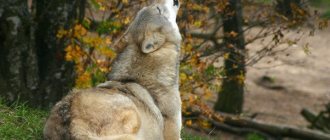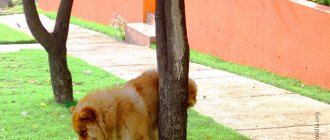The strange behavior of animals sometimes causes bewilderment even among experienced dog breeders. Animal psychologists are already accustomed to questions about why a dog digs holes in the yard or why an animal hunts poultry even if it is well fed. The answer to this, in principle, is one - instinct. It is he who makes a pet sometimes shock its owner.
If your furry pet digs holes in the garden, there is no need to be upset, this is due to its nature. Suffice it to remember that the wild ancestors of dogs, wolves, created shelters for themselves where they bred their offspring. In addition, the reason may be completely banal, for example, the pet is hot, and in this way it cools down. Or the animal belongs to those breeds for which digging a hole is their favorite thing. These include terriers, huskies and dachshunds. But you should not put up with behavior that causes inconvenience to the owner. This article will tell you why dogs dig and how to stop them from doing it.
Boredom
This is one of many reasons. Left at home alone, without their owners who have gone to work or on their own business, dogs begin to show anxiety.
- Separation depresses animals, and they try to entertain themselves with interesting activities to brighten up the tedious hours of waiting.
- In this case, the owner should engage the mental activity of his four-legged friend and offer him a wide variety of dog toys.
- In the absence of the owner, toys will brighten up the pets' leisure time and distract them from their outrageous habit.
On a note! In winter, you should not deprive your four-legged friend living in the yard of attention. A dog needs companionship regardless of the time of year. Otherwise, it negatively affects her psyche and leads to aggression.
What should the owner do?
An owner whose dog suddenly decides to dig up the yard on his own must act consistently:
- Determine the causes and, if possible, compensate for them.
- If an animal digs instinctively and the reason cannot be removed, you can try to correct the behavior - for example, teach it to dig in a certain place.
- If this does not work, use tricks and traditional methods.
And if all three steps do not have an effect, then they turn to a canine specialist or even an animal psychologist, who will talk with a specific animal and offer solutions suitable for it.
Hunting instinct
Many breeds of hunting dogs dig in the ground instinctively. Therefore, when choosing a puppy, the owner must take this into account. The fact is that the paws of such dogs have quite strong pads and powerful claws that protect the limbs from injury during the hunt.
In addition, four-legged hunters have a keen sense of smell, which allows them to find prey under a layer of earth.
- Even small puppies can spend hours digging, which is unlikely to please the owner.
- Terriers are especially diligent in this, and they can be nominated for first place in digging holes.
- This breed was bred specifically for hunting underground animals. However, not all of its representatives are big fans of excavations.
- Short-legged dogs of this breed prefer to dig in the ground - Borders, Yorkies, Norwiches and others.
- Despite the fact that dogs are small and decorative, they can cause quite a lot of trouble in the area.
Second place can be safely given to dachshunds. These small dogs are considered excellent burrow hunters. However, when choosing them as a pet, you should be prepared for the fact that the dachshund, on an instinctive level in search of prey, can dig holes not only in the yard, but also tear up the upholstery on the sofa or other furniture.
To dig means to mark
A very important nuance of dog psychology that every owner needs to understand. If a pet stubbornly digs the floor, blanket, mattress, she considers this item to be her sleeping property. Having scratched the blanket, the dog marks it and don’t be surprised if it tries to steal property or looks at you with an uncomprehending look when you once again pray to the dog gods. Scratching the floor, digging the bed, things, bedding - this is a “symptom” of infringement. Your pet has no property and is forced to appropriate what seems suitable to him.
Another nuance is that between the dog’s toes there are glands that secrete a secretion with an individual smell. When the pet scratched the sheet, he marked it with a scent. This scent is stronger than yours (to the dog) and has more meaning. You can get rid of the markings by washing or treating them with fragrances, for example, if your pet has appropriated a sofa, carpet or bulky blanket.
Body needs
Since dogs are carnivores, their daily diet should include protein-rich animal products. For example, offal and raw meat. However, fiber is also necessary, which is found in plant foods, for example, carrots, zucchini, beets, and pumpkin.
For your information! If a pet digs in the ground in search of roots and plants, it means there is not enough fiber in its body. Therefore, it is worth paying more attention to your pet’s diet and adding foods that contain the missing ingredient.
Sad predictions
The saddest prediction: a dog digs the ground if it feels death is approaching. This may concern the owner, one of his family members, or the person on whose territory the specified action takes place.
- Signs advise distracting your pet as quickly as possible in order to neutralize the negative consequences.
Just don’t need shouts or punishments; on the contrary, you should just call and caress your shaggy friend and play with him.
[custom_ads_shortcode1]
Lack of physical activity
Sometimes digging in the ground is a kind of burst of energy. Regardless of the breed, all dogs - herding, sledding, hunting, decorative, guard - need constant physical activity.
Their lack leads to the fact that four-legged friends begin to be active on their own and dig the ground with excitement. In this case, the pet should immediately be taken to the training ground, taken hunting, or simply walked more often.
Loneliness
Four-legged pets are in many ways reminiscent of small children. If they do not receive the required amount of attention from the owner, they can deliberately “become naughty,” thereby attracting the owner to their person. They dig holes, overturn flower pots, peel off wallpaper, in a word - they play dirty tricks, in the hope that their loved one will play with them more.
So, having discussed the main reasons that prompt your pet to dig up the beds, let’s move on to the question of what to do in order to get rid of this behavior.
[custom_ads_shortcode3]
The desire to stock up “for a rainy day”
Another reason why a dog digs a hole is the desire to hide “yummy” food for future use. She buries excess food in the ground, and after a while digs it up and eats it, which often leads to poisoning.
Interestingly, some pets can run around the area for hours in search of a secluded place for their supplies, and then, having buried food in the ground, constantly check the safety of their treasure.
Build an excavation site
If you can’t overcome a bad habit, give your dog a place where he can dig for pleasure. Fence a small area, dig up the soil, mix it with sand to make it more loose. To attract your pet's attention, bury some treat or toy.
As soon as the dog starts digging in the wrong place, direct it to the designated area. Let him sniff everything and get comfortable. When he starts digging in the indicated place, pet him and praise him. In the future, stick to the system - disapproval of excavations outside the fenced area and praise for digging in the right place.
The desire to establish a rookery
Sometimes, in hot weather, dogs can dig a fairly deep hole to build a rookery in. In such a depression the ground is quite cool and the animal can hide from the painful heat and rest.
It is important to know! In hot summers, you can provide the animal with a cool resting place. To do this, find a shady corner, lay down a damp cloth and place a container of water. With a high probability, the pet will stop digging the ground.
Stressful state
When stressed, the dog begins to dig furiously. At the same time, she can be either very excited or apathetic.
- In this state, the four-legged friend either refuses to eat or simply overeats so much that he then suffers.
- In addition, the pet's behavior changes for the worse.
Aggression may appear or, conversely, the dog begins to yearn and whine, and sometimes becomes too intrusive. In such cases, you should seek help from specialists.
Training methods
Expert opinion
Anna Abramenko
An avid dog lover. Experience in veterinary medicine since 2009.
Ask a Question
It is not easy to train an adult dog to stay in a kennel. If she won't go to the kennel, the following tips will help solve the problem.
The animal needs to be allowed to get comfortable, allowed to enter the new booth, sniff the surrounding area, wait until it gets used to the enclosure
To do this, you should gradually leave the house with him in dry, warm weather and introduce him to his future home. When a dog enters a new home, it is important to reward it with a treat to develop pleasant associations. It is worth putting several of your favorite dog toys in the kennel so that the animal can feel a familiar smell. When the dog is in the kennel, it is important not to forget about it and not leave it alone. A simple game and communication will reinforce positive emotions. It is better to accustom an animal to a new place in warm weather, since in winter being outside can become stressful for him.
The kennel or enclosure is placed facing the front door so that the owner, if necessary, can quickly assess the dog’s condition.
Escape attempt
Sometimes dogs dig under fences to escape. The reason is the reproductive instinct. The smell of a bitch in heat attracts the male dog so much that he will overcome any obstacles.
But even females during the period of sexual hunting in search of a sexual partner can dig a deep hole under the fence and escape. The solution to the problem is to find a mate for your pet.
Comfortable Lair
Sometimes owners are concerned with the question of why the dog digs the bed. This action is dictated by the desire to make a comfortable den for themselves, as wolves do in the wild, crushing grass and making depressions in the ground. After all, dogs are direct descendants of these animals.
- Owners should take a close look at their pet's bed; perhaps it is not very comfortable for him.
- On an instinctive level, dogs perform the ritual of arranging their rookery.
- But if a pet digs in the owner’s bed, this indicates that the dog does not feel safe.
- He will dig until he makes the den safe and comfortable.
The dog digs its bedding on an instinctive level, solely “out of habit.” However, owners should still pay attention - perhaps the dog lacks communication, which is why he gets carried away with his usual activity.
- It is not uncommon for a whelping dog to dig up litter. In this situation, the owner should immediately change the bed.
- It is likely that the four-legged friend is embarrassed by the smell, or the rookery seems uncomfortable to him.
- Therefore, the dog digs after giving birth to rid the offspring of unpleasant odors.
- The desire to “dig deeper” is an instinctive attempt to hide from danger.
An equally interesting question is why a dog digs the floor in an apartment. This indicates that the pet is experiencing some kind of stress or fear. But it is possible that in this way the dog is trying to attract the attention of the owner.
If a dog digs around the house all the time, this is a sure sign that he feels lonely, bored and uncomfortable. One way or another, in these situations it is better to consult a dog trainer or veterinarian.
Why is it so important to identify the cause?
Why does a dog howl at night in the yard: reasons
If an adult dog or puppy digs the ground, you should not take it personally and regard it as sabotage. In most cases, animals do this on a subconscious level. After all, the direct ancestors are wolves, this is how they escape the heat, look for food, and prepare for offspring.
Wolf digs the ground
Nature is nature, but this behavior harms the land, so it is important to identify the true cause and make attempts to correct the behavior.
Signs and superstitions
There are many beliefs and signs associated with the behavior of dogs. For example, people say that if a dog lies down in a hole dug for it, expect illness in the family.
Therefore, our ancestors did not allow a dog with dirty paws into their house.
- If a dog has dug a lot of holes near the house, he wants to leave this house, and this is unfortunate. Therefore, you should take a tuft of hair from the dog, then it will not leave, and trouble will bypass the house.
- Some peoples believed that a hole near a doghouse meant the death of one of the family members. The dog dug a hole near the porch - misfortune will come. Since ancient times, people have coaxed dogs and treated them with respect.
- Today, few modern people listen to signs. To correct their pet’s behavior, dog owners prefer to determine the true cause of their strange behavior, including digging in the ground.
Behavior correction techniques
To correct behavior quickly and successfully, there are rules:
- It is useless to punish for instinctive behavior. The animal will not understand what they want from it, and will only get scared or offended. An offended dog will most likely begin to dig holes with greater zeal than before.
- Any response to behavior must be timely. A strict “no!” It will only help if the pet is caught at the scene of a crime, with its head buried in a fresh hole. But all attempts to explain that a hole is bad when it has already been dug and he has already left it will fail.
- First you need to try to remove the reasons for the behavior, and only then apply educational methods. Because a dog that is hot will continue to dig holes if you do not provide it with water and the opportunity to hide in the shade.
- Any reaction must be consistent. If a dog is told “no!” when they see it in a hole, then they say it every time. If today “it’s impossible!” sounds, but tomorrow the owner forgot, and the day after tomorrow he pitied the animal - there will be no effect from such upbringing.
Consistency, timeliness, the desire to convey what is wrong, and not to punish, are the main assistants in learning. And, before you take it on, you need to try to remove the reasons that prompt the dog to dig the ground on the site.
Elimination of causes
To understand exactly what reason makes a dog dig, just pay more attention to its behavior than usual:
- If a dog is hot, it is noticeable by the fact that it breathes through its mouth, sticking out its tongue, and tries to find a cool place to rest. He drinks a lot and greedily. Lie down, spread out on the ground or floor, hoping to cool down a little. To prevent her from digging a hole and trying to hide, she is provided with shelter from the heat: a bed in the shade, next to a bowl of water, a bed in the house if it has air conditioning. If it doesn't help, water it with a hose - this not only cools the dog down, but is also perceived as a fun game.
- If she is expecting puppies, then the owner’s task is to provide her with a den. Secluded, gloomy, away from places where people constantly walk. To prevent the bitch from trying to find another hole, the owner’s belongings and some of her favorite toys are placed in the den. This will calm her down and help her stop digging.
- If a dog is bored, the owner’s task is to make it stop being bored. To do this, increase the time of walks, play with the dog, run with it, and do not walk with a sedate step. It would be a good idea to find her a friend - the company of other animals benefits pack dogs, they begin to feel better and stop getting bored. You can even get a second dog if you have the desire and funds allow.
- If your pet undermines the beds and eats vegetables, this means that he does not have enough fiber and his diet needs to be reconsidered. You can consult your veterinarian and ask him to prescribe a suitable diet.
- If the pet simply undermines the beds, you need to change the fertilizers. There are some that do not have an attractive scent for dogs, you just need to find the right one.
The remaining reasons cannot be removed so easily.
A hunting dog will still dig, even if he is forbidden - it is in his nature. Dogs who want to hide toys or treats will also dig, and neither females nor males interested in breeding will leave a dig.
They will require other methods.
Developing the right behavior
If the dog digs anyway, you need to make sure that this happens on the owner’s terms. Not in the begonia bed, not in the carrot patch, not in the rose bushes, but somewhere where no damage will be done. For this you need a little:
- Choose a suitable location. Nothing should grow there, people should not walk there and the animal should feel relaxed and confident. It’s good if it’s the back part of the yard, for example, where even guests don’t pass through.
- Fence him in ways that are obvious to the dog. For example, make a fence out of bricks. Or hang bright flags that will show the boundaries.
- Dig up the ground. You can sprinkle it with sand, you can add black soil - the main thing is that it looks loose and attractive for excavation. You can even make a small hole yourself to show your dog an example.
- Place something attractive in the dug up soil. Favorite toy, bones to chew on. Sprinkle a little earth on top.
There is a chance that the dog itself will switch to a new place, where everything is done specifically for it. But this chance is small, and there is no need to rely on it. Instead, you need to monitor the animal, and as soon as it starts digging in the wrong place, take it to the right place.
Show him, let him smell everything. If he starts digging, praise him and pet him.
And then all that remains is to support the system. When a dog digs in the wrong place, interrupt it with an exclamation of “ugh!” or “you can’t!” When he digs where he needs to, praise and stroke him.
Even not very smart animals, after a certain number of repetitions, understand that excavations in the yard are followed by punishment, and excavations in the “dog sandbox” are rewarded, and they switch.
Tips and Tricks
However, not all so simple. If a dog fundamentally wants to dig in a certain part of the site - for example, digs under a fence or catches a mouse that lives somewhere under the garden - an alternative “allowed” place will not attract it.
And all that remains is to use folk tricks:
- If the main purpose of the excavation is to dig, then you can dig around the area and bury the tangled wire at a depth of twenty centimeters. When the dog starts digging again, he will stumble upon it and stop. However, it is important to remember that the wire should not be too thin and not too sharp, otherwise there is a high chance of causing injury and then treating it for a long time and painfully.
- If the main goal is to find a hidden mole, then you can distract the dog and, unnoticed by it, bury an inflated balloon in the unfinished hole. As soon as she continues to dig, she will come across a ball, it will burst loudly and scare her, discouraging her from continuing. The main thing is that the dog’s psyche is strong, otherwise it will begin to be afraid of all loud sounds in general.
If nothing helps, and excavations at the site continue, the only option remains: take the dog to an animal psychologist who can understand what exactly is motivating him and offer several ideas for solving the problem.
Interesting: Dogs with long ears: photo and name of the breed











